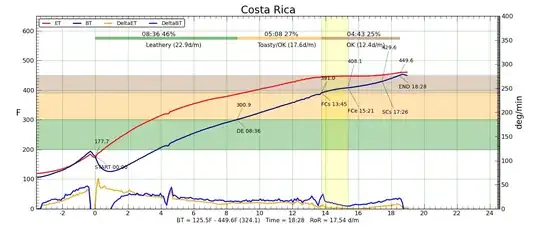With precise devices like sous vide, which have sensors like thermometers that you can download readings from, I am curious if people have started collecting 'cooking profiles' much like coffee roasters do when they measure temperature, moisture, etc while roasting beans?
An example profile, showing environment and bean temperature versus time:
 see also: some forum discussion of profiles, and a video of someone using one
see also: some forum discussion of profiles, and a video of someone using one
These are used in coffee roasting to help produce the best roast you can. Different beans usually have different profiles and even different roasting equipment. The profiles can be used to experiment with different settings like temperature and air flow. They can even be used to control those settings.
I'm curious if people are experimenting in this way with other foods? For example I could imagine eggs being very interesting with their three different layers.